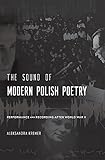The Sound of Modern Polish Poetry : Performance and Recording after World War II / Aleksandra Kremer.
Material type: TextPublisher: Cambridge, MA : Harvard University Press, [2021]Copyright date: ©2021Description: 1 online resource (352 p.)Content type:
TextPublisher: Cambridge, MA : Harvard University Press, [2021]Copyright date: ©2021Description: 1 online resource (352 p.)Content type: - 9780674261112
- 9780674270183
- Knowledge, Theory of
- Nature and nurture
- Social values
- Values
- LITERARY CRITICISM / European / Eastern (see also Russian & Former Soviet Union)
- Anna Kamieńska
- Anna Świrszczyńska
- Halina Poświatowska
- Julia Hartwig
- Julian Tuwim
- Krystyna Miłobędzka
- Poland
- Praat
- audio archive
- free verse
- intonation
- poetry reading
- recitation
- recorded poetry
- sound studies
- sung poetry
- tape recorder
- 155.2/34/01 20
- BD161 .H86 1995
- online - DeGruyter
| Item type | Current library | Call number | URL | Status | Notes | Barcode | |
|---|---|---|---|---|---|---|---|
 eBook
eBook
|
Biblioteca "Angelicum" Pont. Univ. S.Tommaso d'Aquino Nuvola online | online - DeGruyter (Browse shelf(Opens below)) | Online access | Not for loan (Accesso limitato) | Accesso per gli utenti autorizzati / Access for authorized users | (dgr)9780674270183 |
Frontmatter -- Contents -- Introduction -- 1. Postwar Currents: Julian Tuwim and the Evolution of Polish Poetic Culture -- 2. Intonation in Exile: Czesław Miłosz’s English Translations -- 3. Home Literary Salons: Visiting Miron Białoszewski and Wisława Szymborska -- 4. Taped Farewells: Elegiac Recordings by Aleksander Wat, Zbigniew Herbert, Anna Kamieńska, and Anna Swir -- 5. Unbeautiful Readings: Tadeusz Różewicz against Julian Przyboś -- Epilogue -- Notes -- Acknowledgments -- Index
restricted access online access with authorization star
http://purl.org/coar/access_right/c_16ec
An illuminating new study of modern Polish verse in performance, offering a major reassessment of the roles of poets and poetry in twentieth-century Polish culture. What’s in a voice? Why record oneself reading a poem that also exists on paper? In recent decades, scholars have sought to answer these questions, giving due credit to the art of poetry performance in the anglophone world. Now Aleksandra Kremer trains a sharp ear on modern Polish poetry, assessing the rising importance of authorial sound recordings during the tumultuous twentieth century in Eastern Europe. Kremer traces the adoption by key Polish poets of performance practices intimately tied to new media. In Polish hands, tape recording became something different from what it had been in the West, shaped by its distinctive origins behind the Iron Curtain. The Sound of Modern Polish Poetry reconstructs the historical conditions, audio technologies, and personal motivations that informed poetic performances by such luminaries as Czesław Miłosz, Wisława Szymborska, Aleksander Wat, Zbigniew Herbert, Miron Białoszewski, Anna Swir, and Tadeusz Różewicz. Through performances both public and private, prepared and improvised, professional and amateur, these poets tested the possibilities of the physical voice and introduced new poetic practices, reading styles, and genres to the Polish literary scene. Recording became, for these artists, a means of announcing their ambiguous place between worlds. Kremer’s is a work of criticism as well as recovery, deploying speech-analysis software to shed light on forgotten audio experiments—from poetic “sound postcards,” to unusual home performances, to the final testaments of writer-performers. Collectively, their voices reveal new aesthetics of poetry reading and novel concepts of the poetic self.
Mode of access: Internet via World Wide Web.
In English.
Description based on online resource; title from PDF title page (publisher's Web site, viewed 01. Dez 2022)


